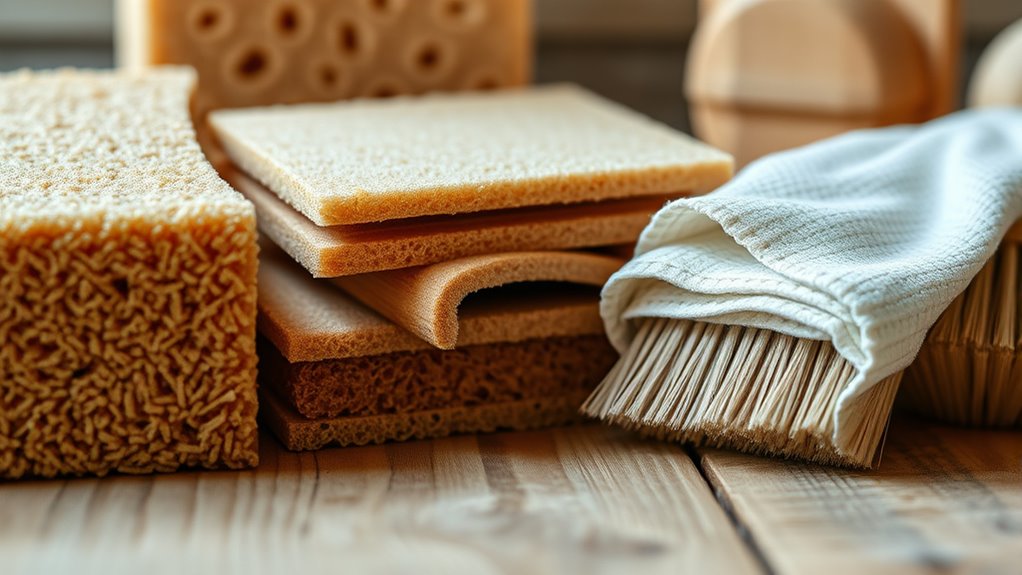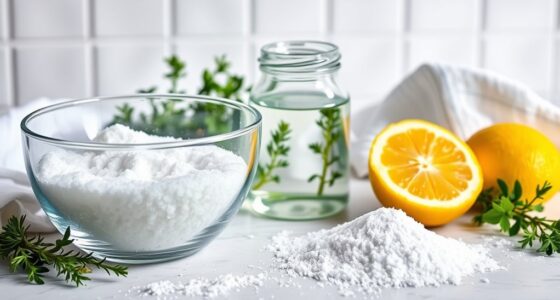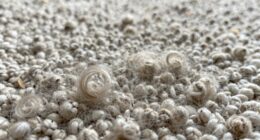Compostable sponges, wipes, and brushes can work effectively when made from natural materials like cellulose or bamboo and certified by reputable organizations. They break down in industrial composting facilities within a few months, leaving only compost, water, and CO₂ behind. However, their success depends on proper disposal—placing them in the right composting environment is essential. To discover how to maximize their eco benefits and guarantee they really work, keep exploring these products further.
Key Takeaways
- Compostable sponges, wipes, and brushes can break down effectively in industrial composting facilities within 90-180 days.
- Their success depends on proper disposal in suitable composting environments; landfills may inhibit decomposition.
- Certified products from reputable organizations ensure they meet biodegradability and compostability standards.
- Materials like cellulose, bamboo, and cornstarch are common in compostable cleaning tools, supporting eco-friendly breakdown.
- Proper disposal and manufacturing practices are essential for these products to work as intended environmentally.

Are you looking for eco-friendly alternatives to traditional cleaning tools? If so, compostable sponges, wipes, and brushes might catch your attention. These products promise to reduce waste and minimize environmental impact, but it’s vital to understand whether they really deliver on their claims. One key factor to take into account is biodegradability testing, which measures how effectively a product breaks down in natural environments. Manufacturers committed to eco friendly manufacturing often undergo rigorous biodegradability testing to ensure their products decompose within a reasonable timeframe, without leaving harmful residues. This testing provides confidence that these tools won’t persist in landfills or pollute ecosystems long after disposal.
When it comes to compostability, it’s not enough for a product to just be biodegradable; it must also meet specific standards that allow it to break down in composting conditions. Many compostable sponges and wipes are designed to disintegrate fully within a certain period, typically 90 to 180 days, leaving behind only compost, water, and carbon dioxide. To achieve this, manufacturers often use plant-based materials such as cellulose, bamboo, or cornstarch, which are naturally biodegradable and suitable for eco friendly manufacturing processes. These materials are processed without harmful chemicals, ensuring that when you dispose of them, they don’t introduce toxins into the environment. Additionally, understanding the difference between biodegradability and compostability helps ensure you select truly eco-friendly products.
However, it’s essential to verify if these products are certified by reputable organizations like the Biodegradable Products Institute (BPI) or the Compost Manufacturing Alliance (CMA). Certification indicates that the products meet strict standards for biodegradability and compostability. Without such certification, claims of being eco-friendly can be misleading or exaggerated. You should also look into whether the manufacturing process itself minimizes environmental impact, using renewable energy sources or sustainable materials, which further supports eco friendly manufacturing.
While compostable sponges, wipes, and brushes offer a greener alternative, they’re not a perfect solution in every situation. Proper disposal is vital; compostable items need to be placed in industrial composting facilities to fully decompose. If you throw them in regular trash or backyard compost, they might end up in landfills where oxygen levels are too low for proper decomposition. So, it’s important to be aware of local composting options and facilities. Being informed about disposal methods can help maximize the environmental benefits of these products.
Frequently Asked Questions
How Long Do Compostable Sponges Typically Take to Decompose?
Compostable sponges usually take about 1 to 6 months to decompose, depending on environmental factors. If you place them in a hot, aerated compost pile, they’ll break down faster. Cooler, wetter conditions slow the process. To guarantee proper decomposition, cut the sponge into smaller pieces and avoid adding it to a compost bin with synthetic materials. Monitoring environmental factors helps you estimate the decomposition timeline accurately.
Are Compostable Wipes Effective Against Stubborn Stains and Bacteria?
Imagine releasing a tiny biodegradable army to battle stubborn stains and bacteria—sounds promising, right? Compostable wipes can be effective, but their stain removal efficiency varies with biodegradation rates. While they may handle light messes, don’t expect them to conquer the toughest grime. For deep stains and bacteria, traditional cleaning methods still reign supreme, and these eco-friendly warriors are better suited for gentle cleanup rather than heavy-duty battles.
Can Compostable Brushes Replace Plastic Ones in All Cleaning Tasks?
Yes, compostable brushes can substitute plastic ones in many cleaning tasks, but they might not be suitable for all. Synthetic alternatives often outperform compostable options in durability and effectiveness, especially for tough scrubbing. While compostable brushes are a great plastic replacement for light cleaning and eco-conscious use, you should evaluate the specific task to verify the compostable option meets your needs for strength and longevity.
Do Compostable Cleaning Tools Contain Any Synthetic or Harmful Chemicals?
Most compostable cleaning tools are made from natural materials, so they generally don’t contain synthetic additives or harmful chemicals. However, some may have chemical residues from manufacturing processes or coatings to enhance durability. It is crucial to check labels or product info to confirm no synthetic additives are included. Overall, compostable tools tend to be safer for your health and the environment, but always verify for peace of mind.
What Composting Conditions Are Needed for These Products to Break Down Properly?
Imagine your compost as a lively river, requiring oxygen, warmth, and moisture to cleanse debris like marine pollution. To break down compostable cleaning tools properly, keep the temperature between 130-160°F, guarantee high humidity, and turn the compost regularly. Bust the myths of slow decay by maintaining these ideal conditions, so your eco-friendly tools return to the earth swiftly, not contributing to marine pollution or lingering as false promises.
Conclusion
As you reach for that compostable sponge, imagine it breaking down gently in your garden compost, returning to the earth like a quiet whisper of nature’s cycle. These eco-friendly tools aren’t just practical—they’re part of a bigger picture, helping your home breathe a little easier. With every wipe and scrub, you’re weaving sustainability into your daily routine, leaving behind a trail of greener days. Embrace these compostable choices and watch your eco-consciousness bloom.









